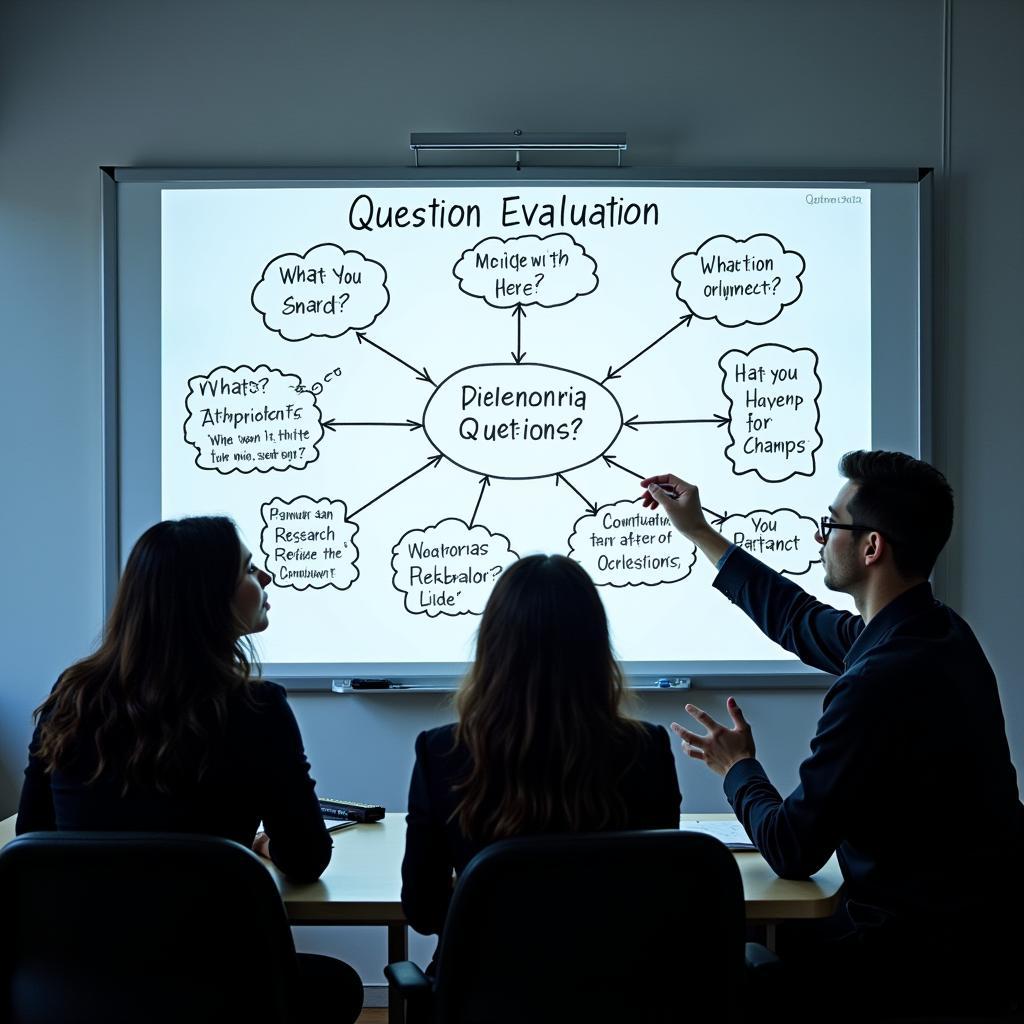Evaluating Research Questions is the cornerstone of any credible investigation, whether you’re exploring the mysteries of the universe or the spectral whispers of a haunted house. A well-formulated question guides your research, shapes your methodology, and ultimately determines the validity of your findings. In the realm of paranormal research, where evidence can be elusive and interpretations varied, rigorous question evaluation is paramount.
The Importance of Evaluating Research Questions in Paranormal Investigations
A strong research question acts like a compass, directing your exploration through the often-murky waters of the unknown. It provides a framework for your investigation, helping you discern relevant data from distracting noise. Without a clearly defined question, your research risks becoming aimless, leading to inconclusive results and unsubstantiated claims. Imagine searching for evidence of ghostly apparitions without first specifying the type of apparition, the time period, or even the specific location. You’d be lost in a sea of irrelevant data. This is where evaluating research questions becomes essential. It forces you to refine your focus, ensuring your efforts are targeted and productive.
How to Evaluate Your Research Questions
Effective research question evaluation involves a multi-faceted approach, considering not only the question itself but also its relevance to the broader field of study. Here’s a breakdown of key factors to consider:
- Clarity: Is your question easily understandable? Avoid ambiguity and jargon that could confuse your audience.
- Focus: Does your question address a specific aspect of the paranormal? A narrowly focused question allows for deeper exploration.
- Measurability: Can your question be investigated through observable phenomena or data collection? Can you quantify or qualify your findings?
- Relevance: Does your question contribute to the existing body of paranormal research? Does it address a gap in current understanding?
- Feasibility: Can your question be answered within the limitations of your resources and timeframe? Be realistic about what you can achieve.
 Research Question Evaluation in Paranormal Investigations
Research Question Evaluation in Paranormal Investigations
Common Pitfalls to Avoid
Several common mistakes can hinder the effectiveness of your research questions. Being aware of these pitfalls can help you refine your approach and ensure more robust findings.
- Leading Questions: Avoid phrasing your questions in a way that suggests a predetermined answer. This biases your investigation and undermines its objectivity.
- Overly Broad Questions: Questions that are too general lack focus and make it difficult to gather meaningful data. For example, asking “Do ghosts exist?” is too broad; a more focused question might be “Is there evidence of spectral activity in the Gettysburg battlefield?”
- Untestable Questions: Some questions, while intriguing, may simply be beyond the realm of scientific investigation. Avoid questions that rely on subjective experiences or unverifiable claims.
ux research methods pdf can be unexpectedly helpful in this context.
Applying the Evaluation Process: A Real-World Example
Let’s say you’re investigating a reportedly haunted house. You might start with the broad question: “Is this house haunted?” While a valid starting point, this question needs further refinement. Applying the evaluation criteria outlined above, you could refine your question to: “Is there evidence of unexplained electromagnetic fluctuations in the master bedroom between midnight and 3 am?” This refined question is clear, focused, measurable, and feasible, making it a much stronger foundation for your investigation.
marketing research refers to a broader understanding of research methodologies, but the principles of formulating a strong research question remain crucial.
Expert Insights
Dr. Evelyn Reed, a renowned parapsychologist, emphasizes the importance of precision: “In paranormal research, as in any scientific endeavor, the quality of your questions dictates the quality of your answers. A vague question yields a vague result.” Similarly, Dr. Michael Carter, a leading researcher in EVP analysis, adds, “A testable research question is the cornerstone of a credible paranormal investigation. It allows us to move beyond speculation and towards verifiable evidence.”
Conclusion
Evaluating research questions is not merely a preliminary step; it’s an ongoing process that shapes every stage of your paranormal investigation. By carefully crafting and refining your questions, you ensure your research is focused, productive, and ultimately contributes to a deeper understanding of the mysteries that surround us. Remember, the key to unlocking the secrets of the paranormal lies in asking the right questions. For further insights, check out resources on high school research paper topics.
FAQ
- What is the most important aspect of evaluating research questions?
- How can I make my research questions more measurable?
- What are some examples of untestable research questions in the paranormal field?
- Why is it important to avoid leading questions?
- How can I refine a broad research question into a more focused one?
- Where can I find more resources on effective research methods in paranormal investigation?
- What role does evaluating research questions play in ensuring the credibility of paranormal research?
Need more help with your Paranormal Research? Contact us at Phone Number: 0904826292, Email: research@gmail.com or visit us at No. 31, Alley 142/7, P. Phú Viên, Bồ Đề, Long Biên, Hà Nội, Việt Nam. Our team is available 24/7 to assist you. You may also find helpful information about what is an intervention in a research study or consider exploring a career as a data research analyst.